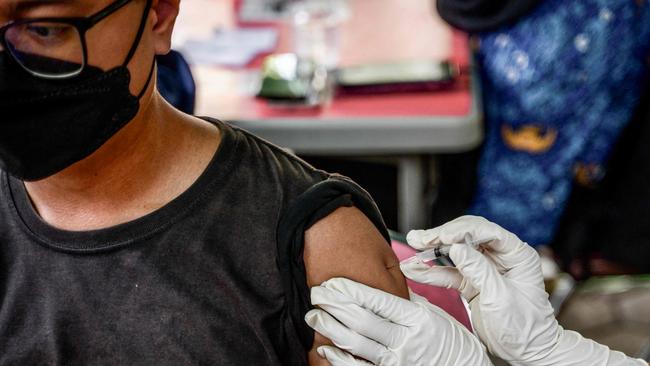Gift for Beijing: Asia-Pacific analysts say shock US aid freeze ‘an own goal’
The US foreign aid freeze has thrown development projects across the Asia-Pacific into chaos as US-AID closes its Washington headquarters.

The US government’s 90-day foreign aid freeze has thrown development projects across the Asia-Pacific into chaos, prompting warnings of a long-term fallout that risks undermining the legitimacy of all Western governments – including Australia – in the midst of a political competition for influence.
Regional analysts say the suspension of more than $US60bn of international funding administered through the US government’s main aid body, the US Agency for International Development, or US-AID, represents an own goal and a “gift” for Beijing.
Amid widespread criticism of the move, US-AID closed its headquarters to agency personnel as President Donald Trump lashed out at the organisation’s management, claiming it was being “run by radical lunatics” who he intended to clear out.
An email to USAID personnel said that the move was taken by “Agency leadership.”
The aid pause, announced on the first day of the second Trump administration last month, affects critical projects throughout Asia-Pacific, from vaccine rollouts in Pacific Island nations to mine clearing in Laos and Cambodia, anti-human trafficking programs across Southeast Asia, democracy promotion, and basic healthcare funding in East Timor.
Regional development agencies have described a climate of chaos and confusion, with tens of thousands of local jobs and projects immediately suspended as they try to understand the implications of the blanket move.
Indonesian Health Minister Budi Gunadi Sadikin said he expected the US withdrawal from the World Health Organisation to also effect the supply of medicines and medical equipment but that his government was looking to build co-operation with alternative suppliers, including Saudi Arabia and India. The health ministry was looking to Australia to help breach the gap.
Canberra, too, is grappling with the potential impact of the freeze, not just for jointly funded infrastructure programs across the wider region, such as undersea cables, but for multilateral projects and the overall legitimacy of the Western development agenda.
“If those projects are disrupted then Canberra would be looking to make the case that these are opportunities from a strategic security standpoint and should be allowed to go ahead,” said Lowy Institute Indo-Pacific development centre director Roland Rajah.
“It’s a huge gift to China absolutely, and the legitimacy question is a big one. Australia is trying to uphold the legitimacy of the rules-based order and existing multilateral system, and now you have the biggest component of that destroying it and moving away from its commitments and principles.
“Predictability in aid is key to the effectiveness of programs. When you’re talking about providing critical public services – medicines, food, humanitarian assistance or, in the case of small countries, infrastructure – being financed is critical for driving their economies. If that freezes then you have a big problem.”
Pacific Island leaders have also warned the freeze could have a lasting effect on a vulnerable region where geopolitical competition is at its most intense. Former Fijian ambassador to the US Satyendra Prasad, now a senior fellow with the Carnegie Institute, said US-AID had increased its presence in the region in recent years and any disruption to its development program could have serious geopolitical impacts.
“Of all the tools that President Trump has at his disposal to advance US interests in the Pacific, by far the most important is US-AID,” he said. “We are small countries with small bureaucracies and small economies and the one thing that matters disproportionately in the Pacific is stability and continuity around which trust is built.
“Disruptions like this affect the way the Pacific thinks about the external world and if it’s too unsettling then there are political consequences.
“It is such an own goal.”
Most small island nations lacked the economic heft to unilaterally shore up big development programs for three months or more, and many of the current US-funded projects could take months or even years to rebuild, Dr Prasad added.
Aid advocates have raised particular concerns about the future of US-backed HIV/AIDS programs that distribute lifesaving anti-retro-viral medicines. Infection rates are surging in Fiji and Papua New Guinea and PNG’s health agencies are struggling to reduce transmission rates from mother to child, currently at 30 per cent.
While the US State Department on Saturday announced an exemption for the program – as part of a broader carve out for emergency food aid, shelter and life-saving medicines – the lack of detail has left many groups unsure whether they can continue.
Aditya Ardhana from Indonesia’s AIDS coalition said at least five programs in Jakarta and Bandung had come to a standstill, affecting prevention, testing and treatment for tens of thousands of people.
Compounding the uncertainty, the US-AID’s website went offline over the weekend amid reports the government was preparing to merge the agency into the US State Department.
While the move is not without precedent – the Australian and British governments have also merged their dedicated development agencies into their respective foreign affairs ministries – in both cases those mergers took several years.
Additional reporting: Dian Septiari




To join the conversation, please log in. Don't have an account? Register
Join the conversation, you are commenting as Logout